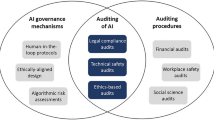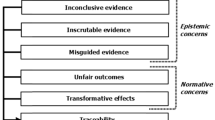Abstract
This article addresses academic integrity initiatives at a large research university. The article explains the rationale for the creation of the honor system office and its evolution to date. Data collected from academic violation cases during the program’s first two years are included.



Similar content being viewed by others
References
Aggie Code of Honor. (n.d). [Brochure]. College Station, TX: Texas A&M University.
Aggie Honor System Office. (n.d) Retrieved July 26, 2006, from http://www.tamu.edu/aggiehonor/index.html
Aggie Honor System Office Final Task Force Report (2004). College Station, TX: Texas A&M University.
Aggie Honor System Office Honor Council Training Manual (2004). College Station, TX: Texas A&M University.
Blue book: Regulations established by the faculty; regulations established by the Board of Directors (1912). Austin, TX: [The College].
Bowers, W. J. (1964). Student dishonesty and its control in college. (Cooperative Research Project No. OE 1672). New York, NY: Bureau of Applied Social Research, Columbia University.
Center for Academic Integrity. CAI Research. Retrieved April 3, 2006 from http://academicintegrity.org/cai_research.asp
Classes vote down new honor code (1953, April 10). The Battalion (p. 1).
Dethloff, H. C. (1975). A centennial history of Texas A&M University, 1876–1976. College Station, TX: Texas A&M University Press.
Dufresne, R. L. (2004). An action learning perspective on effective implementation of academic honor codes. Group & Organization Management, 29, 201–218.
Hall, T. L., & Kuh, G. D. (1998). Honor among students: Academic integrity and honor codes at state-assisted universities. NASPA Journal, 36, 2–18.
Integrity survey to poll students (2002, January 30). The Battalion, p. 1.
Intercouncil proposes “honor code” (1953, March 3). The Battalion (p. 1).
May, K. M., & Loyd, B. H. (1993). Academic dishonesty: The honor system and students’ attitudes. Journal of College Student Development, 34, 125–129.
McCabe, D. L. (1992). The influence of situational ethics on cheating among college students. Sociological Inquiry, 62, 365–374.
McCabe, D. L., & Bowers, W. J. (1994). Academic dishonesty among males in college: A thirty year perspective. Journal of College Student Development, 35, 5–10.
McCabe, D. L., & Pavela, G. (2004). Ten [updated] principles of academic integrity: How faculty can foster student honesty. Change, 36(3), 10–15.
McCabe, D. L., & Trevino, L. K. (1993). Academic dishonesty: Honor codes and other contextual influences. The Journal of Higher Education, 64, 522–538.
McCabe, D. L., & Trevino, L. K. (1997). Individual and contextual influences on academic dishonesty: A multicampus investigation. Research in Higher Education, 38, 379–396.
McCabe, D. L., Trevino, L. K., & Butterfield, K. D. (1999). Academic integrity in honor code and non-honor code environments. The Journal of Higher Education, 70, 211–234.
McCabe, D. L., Trevino, L. K., & Butterfield, K. D. (2002). Honor codes and other contextual influences on academic integrity: A replication and extension to modified honor code settings. Research in Higher Education, 43, 357–378.
Park, C. (2004). Rebels without a clause: Towards an institutional framework for dealing with plagiarism by students. Journal of Further and Higher Education, 28, 291–306.
Scott, K. (2001). Academic dishonesty: The impact of honor codes on cheating as perceived by student leaders in selected Texas universities. Dissertation Abstracts International, 62(04), 1359. (UMI no. 729052851)
SGA promotes academic honor with campaign (2000, December 4). The Battalion, pp. A1, A2.
Stern, E. B., & Havlicek, L. (1986). Academic misconduct: Results of faculty and undergraduate student surveys. Journal of Allied Health, 15, 129–142.
Zelna, C. L., & Bresciani, M. J. (2004). Assessing and addressing academic integrity at a doctoral intensive institution. NASPA Journal, 42, 72–93.
Acknowledgement
The authors would like to thank Matt Fry, Director of the Aggie Honor System Office for permission to use the statistical data and for his willingness to share his knowledge of AHSO procedures.
Author information
Authors and Affiliations
Corresponding author
Additional information
Pauline Melgoza
is Assistant Professor and Physical Sciences Librarian at Texas A&M University. She received her B.S. and her M.S. from Texas A&M University and her MLIS from the University of North Texas. She was a member of the Academic Integrity Team and served two years on the Honor Council of the Aggie Honor System Office.
Jane Smith
is Assistant Professor and Education Reference Librarian at Texas A&M University. She received her B.S. from the University of Texas at Austin and her MLIS from Texas Woman’s University. Interests include information literacy, bibliographic instruction and faculty outreach.
Rights and permissions
About this article
Cite this article
Melgoza, P., Smith, J. Revitalizing an Existing Honor Code Program. Innov High Educ 32, 209–219 (2008). https://doi.org/10.1007/s10755-007-9048-6
Published:
Issue Date:
DOI: https://doi.org/10.1007/s10755-007-9048-6




